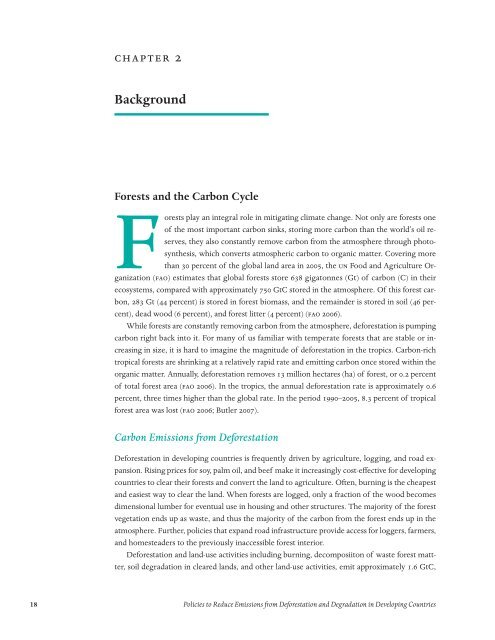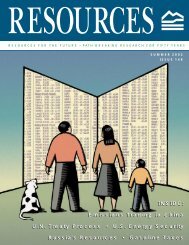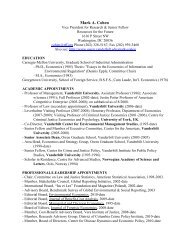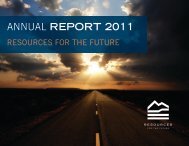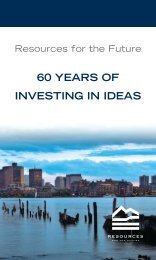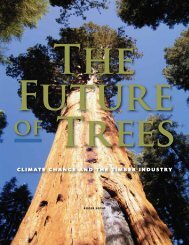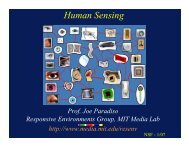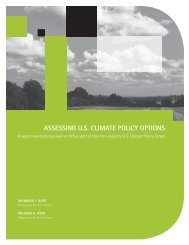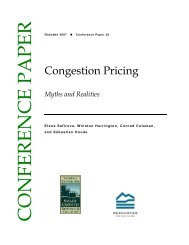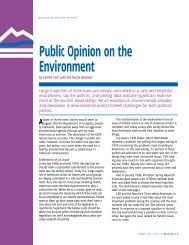Policies to Reduce Emissions from Deforestation and Degradation ...
Policies to Reduce Emissions from Deforestation and Degradation ...
Policies to Reduce Emissions from Deforestation and Degradation ...
Create successful ePaper yourself
Turn your PDF publications into a flip-book with our unique Google optimized e-Paper software.
chapter 2<br />
Background<br />
Forests <strong>and</strong> the Carbon Cycle<br />
Forests play an integral role in mitigating climate change. Not only are forests one<br />
of the most important carbon sinks, s<strong>to</strong>ring more carbon than the world’s oil reserves,<br />
they also constantly remove carbon <strong>from</strong> the atmosphere through pho<strong>to</strong>synthesis,<br />
which converts atmospheric carbon <strong>to</strong> organic matter. Covering more<br />
than 30 percent of the global l<strong>and</strong> area in 2005, the UN Food <strong>and</strong> Agriculture Organization<br />
(FAO) estimates that global forests s<strong>to</strong>re 638 giga<strong>to</strong>nnes (Gt) of carbon (C) in their<br />
ecosystems, compared with approximately 750 GtC s<strong>to</strong>red in the atmosphere. Of this forest carbon,<br />
283 Gt (44 percent) is s<strong>to</strong>red in forest biomass, <strong>and</strong> the remainder is s<strong>to</strong>red in soil (46 percent),<br />
dead wood (6 percent), <strong>and</strong> forest litter (4 percent) (FAO 2006).<br />
While forests are constantly removing carbon <strong>from</strong> the atmosphere, deforestation is pumping<br />
carbon right back in<strong>to</strong> it. For many of us familiar with temperate forests that are stable or increasing<br />
in size, it is hard <strong>to</strong> imagine the magnitude of deforestation in the tropics. Carbon-rich<br />
tropical forests are shrinking at a relatively rapid rate <strong>and</strong> emitting carbon once s<strong>to</strong>red within the<br />
organic matter. Annually, deforestation removes 13 million hectares (ha) of forest, or 0.2 percent<br />
of <strong>to</strong>tal forest area (FAO 2006). In the tropics, the annual deforestation rate is approximately 0.6<br />
percent, three times higher than the global rate. In the period 1990–2005, 8.3 percent of tropical<br />
forest area was lost (FAO 2006; Butler 2007).<br />
Carbon <strong>Emissions</strong> <strong>from</strong> <strong>Deforestation</strong><br />
<strong>Deforestation</strong> in developing countries is frequently driven by agriculture, logging, <strong>and</strong> road expansion.<br />
Rising prices for soy, palm oil, <strong>and</strong> beef make it increasingly cost-effective for developing<br />
countries <strong>to</strong> clear their forests <strong>and</strong> convert the l<strong>and</strong> <strong>to</strong> agriculture. Often, burning is the cheapest<br />
<strong>and</strong> easiest way <strong>to</strong> clear the l<strong>and</strong>. When forests are logged, only a fraction of the wood becomes<br />
dimensional lumber for eventual use in housing <strong>and</strong> other structures. The majority of the forest<br />
vegetation ends up as waste, <strong>and</strong> thus the majority of the carbon <strong>from</strong> the forest ends up in the<br />
atmosphere. Further, policies that exp<strong>and</strong> road infrastructure provide access for loggers, farmers,<br />
<strong>and</strong> homesteaders <strong>to</strong> the previously inaccessible forest interior.<br />
<strong>Deforestation</strong> <strong>and</strong> l<strong>and</strong>-use activities including burning, decomposii<strong>to</strong>n of waste forest mattter,<br />
soil degradation in cleared l<strong>and</strong>s, <strong>and</strong> other l<strong>and</strong>-use activities, emit approximately 1.6 GtC,<br />
1 <strong>Policies</strong> <strong>to</strong> <strong>Reduce</strong> <strong>Emissions</strong> <strong>from</strong> <strong>Deforestation</strong> <strong>and</strong> <strong>Degradation</strong> in Developing Countries


